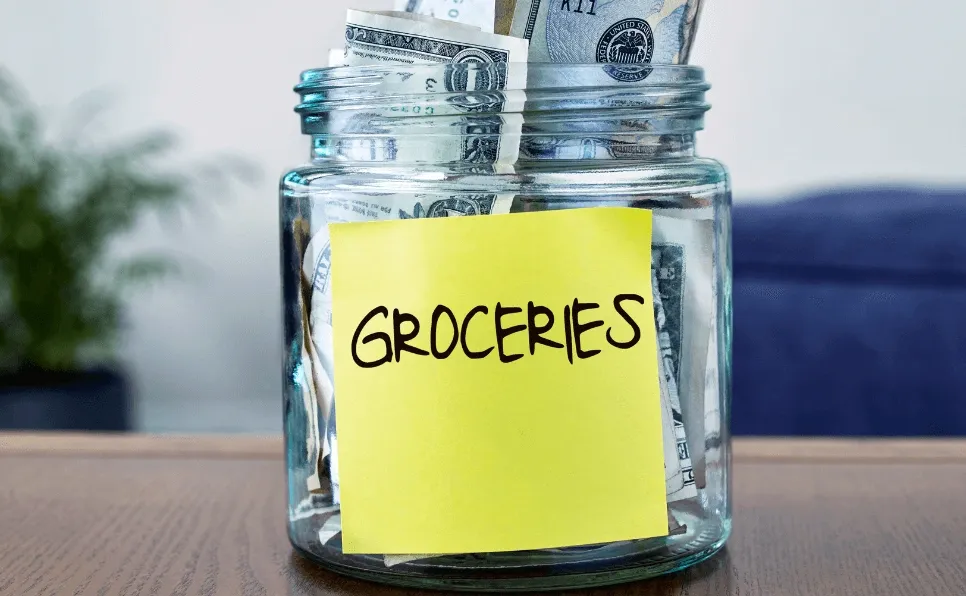Grocery shopping can take a significant chunk of your monthly budget. With rising food prices, keeping your grocery bill within a reasonable range can be challenging. However, the good news is that there are plenty of ways to save money on groceries without sacrificing the quality of your meals.
By implementing some simple strategies and making a few changes to your shopping habits, you can significantly reduce your grocery expenses and still enjoy delicious, healthy meals. In this blog post, we’ll explore some of the best tips and tricks for saving money on groceries, including creating a grocery budget, making a grocery list, taking advantage of coupons, buying in bulk, shopping at local markets, and much more. So let’s dive in and start saving money on our grocery bills!
Table of Contents
Create a Grocery Budget
Creating a grocery budget is the first step to saving money on groceries. You’ll want to set a weekly or monthly budget for your grocery shopping and stick with it! It’s easy to get carried away when shopping for food and spending more than you intended.
If you have a large family, it can be challenging to keep track of how much each item costs when buying in bulk. When calculating how much each item costs per serving (or per person), use this formula: Cost/Number of Servings = Cost Per Serving. For example: If an 8oz bag of pasta costs $2 at Walmart and serves four people (16 oz), then divide $2 by 16 oz = $0.125 per ounce or 0-1/4 cents per ounce).
Make a Grocery List
To save money on groceries, making a grocery list is important.
To do this, you’ll need to plan your meals for the week ahead of time. Write down all the ingredients required for each meal and stick with them! This will help prevent impulse buys that can add up quickly over time.
Take Advantage of Coupons
Look for coupons online. Many websites offer printable coupons, including Coupons.com and RedPlum.
Sign up for store loyalty programs. Many grocery stores have loyalty cards that allow you to earn points towards future purchases or other rewards as you shop, so sign up if your favorite store has one of these programs!
Find out when stores offer special items and buy them then! For example, if peanut butter is on sale at your local supermarket this week (and it usually isn’t), stock up!
Buy in Bulk
Buying in bulk is a great way to save money on groceries. You can get discounts on many items if you buy them in large quantities, and it’s often cheaper than buying the same item individually.
Buying items with long shelf lives is also a good idea because they go smoothly as quickly as other foods do, so you won’t have to throw away spoiled food or waste money by throwing out expired products when their expiration date has passed. Some examples of these types include:
- Rice and beans (they last for months)
- Nuts (they last for years)
- Oatmeal packets (they last for several months)
- Shop at Local Markets
To save money and eat healthier, shop at local markets. You can find fresh produce at farmers’ markets or your local grocery store. Buying items like grains and beans in bulk will save you money because they’ll last longer than if you purchased them individually packaged from the grocery store aisle.
If you’re looking for discounts on produce, check out what’s available at your local farmer’s market–they often have deals on certain times of day or days of the week that make it worth visiting earlier rather than later (or vice versa).
Buy Store Brand Products
The next step is to look for store-brand products that are cheaper than the name brands. You can do this by comparing the ingredients of in-store brand and name-brand products and looking for ones with the same quality. For example, if you’re buying cereal, compare Kellogg’s Frosted Flakes and General Mills’ Cheerios (two popular cereal brands). If they have similar ingredients and nutritional values, choose the cheaper option!
Plan Meals Around Sale Items
Plan meals around sale items. This is a great way to save money on groceries, especially if you need more time for meal planning. For example, if chicken breasts are on sale at your local grocery store, plan a few different ways to prepare them (fried chicken breast sandwiches with homemade pickles and mayo; baked chicken breast with broccoli and cheese sauce) so that they don’t go bad before you can use them up.
Buy items in season locally grown produce because they’ll be cheaper than buying out-of-season produce shipped from far away places like California or Mexico, where it’s grown year-round regardless of whether it’s ripe yet!
Overall, there are many ways to save money on groceries. By creating a grocery budget, making a grocery list, taking advantage of coupons, buying in bulk, shopping at local markets, buying store brand products, planning meals around sale items, cooking at home, growing your food, and choosing frozen over fresh, you can save money on your grocery bill while still eating healthy and delicious meals. Remember, small changes can add up over time, so start implementing these strategies today and watch your savings grow!
FAQs
How can creating a grocery budget help save money?
Creating a grocery budget allows you to set a limit on how much you can spend on groceries each week or month. By sticking to this budget, you can avoid overspending and make more conscious choices while shopping.
How can making a grocery list save money?
Making a grocery list helps you plan your meals in advance and ensures that you only buy what you need. It prevents impulse purchases and reduces the chances of buying unnecessary items, ultimately saving you money.
What are some ways to find and use coupons for groceries?
You can find coupons online on websites such as Coupons.com and RedPlum. Additionally, signing up for store loyalty programs can provide access to exclusive discounts and coupons. Utilizing these coupons when shopping can help reduce your grocery expenses.
Why is buying in bulk a money-saving strategy?
Buying in bulk allows you to take advantage of discounted prices for purchasing larger quantities. Items bought in bulk are often cheaper per unit or weight compared to buying them individually. It’s particularly beneficial for items with a long shelf life.
How can shopping at local markets help save money on groceries?
Local markets, such as farmers’ markets, often offer fresh produce at lower prices compared to grocery stores. Buying directly from local producers can be more cost-effective and supports the community. Additionally, purchasing grains and beans in bulk from local markets can help save money in the long run.
Are store-brand products a good way to save money?
Store-brand products are typically cheaper than name-brand products but often have similar quality. By comparing store-brand and name-brand products’ ingredients and nutritional values, you can choose the more affordable option without sacrificing quality.
How can planning meals around sale items help with saving money?
When certain items are on sale, you can plan meals that incorporate discounted ingredients. This helps you make the most of the sale items and prevents them from going to waste. By strategically planning meals around sale items, you can save money and still enjoy a variety of dishes.
Are there any other tips for saving money on groceries?
Some additional tips for saving money on groceries include cooking at home instead of dining out, growing your own food if possible, choosing frozen produce over fresh when it’s more cost-effective, and being mindful of portion sizes to avoid food waste.





